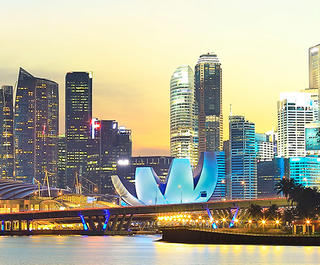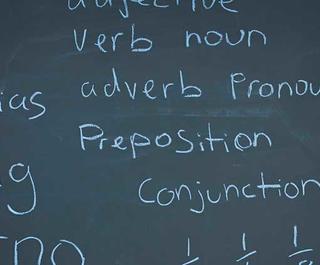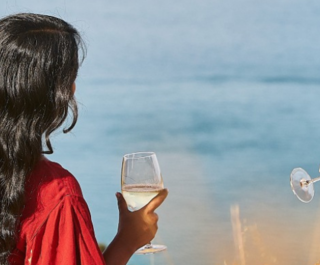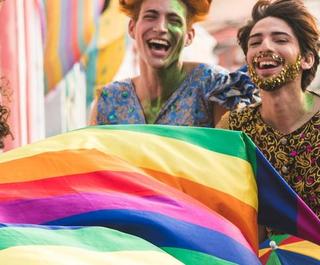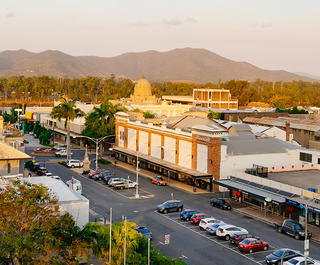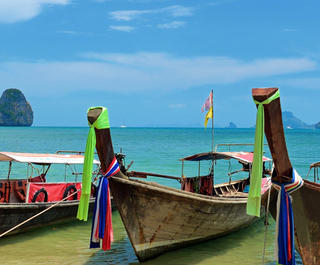
It's been observed that when prolific traveller, Michael Palin produces a television series and a corresponding book on a particular region - that destination experiences a spike in tourism. The effect has been dubbed by some commentators as the Palin Effect.
"I don't know if it really operates. We've had audiences of five or six million for some series. So I suppose if even a hand full of people go after watching the show then that would have some sort of effect," said Michael.
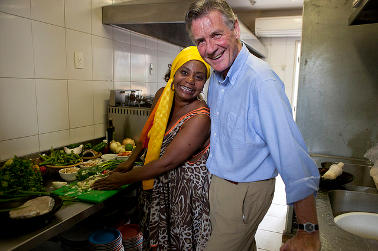 Michael Palin and chef Dada
Michael Palin and chef Dada
"I went to the Sahara where nobody goes and also to Pakistan. I think it's when I go to remote destinations that the show would encourage travel. I've never benefited from the Palin effect myself."
Michael Palin has spent much of 2012 travelling through Brazil, a nation poised for greatness not least because it will host the World Cup in 2014 and the Olympics in 2016. Through his travels, Michael observed a country in tremendous flux, as a thriving economy continues to assert the nation's importance in South America and around the world.
"Why Brazil? It's a big gap in all the travels I've done. I've been through Chile, Peru, Colombia and glimpsed Brazil from across the river. About three or four years ago there was a sudden interest in Brazil. People suddenly realised that it was going to be one of the great economies of the future," he said.
"I had to see the place for myself and curiosity led me there. I would make a program just after the London Olympics when people would see Rio at the closing ceremony and people would be talking about Brazil."
The television series, entitled Michael Palin's Brazil, produced on the back of Michael's exploration is broken into four episodes - each episode is dedicated to a different region. The first episode focuses on the northeast coast, the second features the country's interior including the vast Amazon rainforest, the third puts a spotlight onto Rio de Janeiro and the nearby mining area and the series concludes with São Paolo and the southern region.
"One of my favourite cities in the world is now Salvador de Bahia. Salvador buzzes to me, being from Northern Europe, with a very unfamiliar feeling, a great noise of live music, exotic spicy seafood and a religion that I'd never experienced before called Candomblé - it's a mixture of African and the Catholic religion that the Portuguese brought in."
It was in Salvador de Bahia that Michael visited a high priest to have his fortune told.
"This was chanting the African language and he read cowry shells. He said I was well travelled and that I had three children - so he'd probably been on Google earlier in the day. I respect people that can see and they know the ritual, so I said could you answer a question that many English people want to know with the World Cup coming up. I said, 'Will England win the world cup ever again?' And he got the shells and he scattered them all over the table and then said, 'No!' It was perfect comic timing."
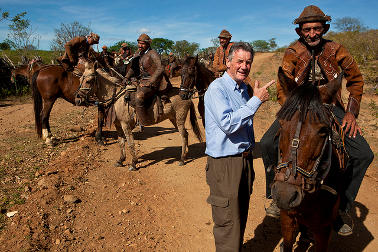 Michael with Cowboys at Pega de Boi
Michael with Cowboys at Pega de Boi
In another experience from his travels, Michael found himself on top of a float for the annual Gay Pride Parade along Copacabana beach in Rio de Janeiro.
"The day we got to Rio it was the day of the gay pride march. I was asked by the President of the transvestite and transsexual unit of the Rio state council, a man called Marjorie, if I would like to join the gay pride march," said Michael.
"They said that they had a special place on top of the transvestite and transsexual bus. It turned out that Marjorie had been in the very first gay pride march only twenty years ago and he said that there were less than thirty people there and when they got to the end of the march, people threw fruit at them. And he said, 'now look around you.' And indeed there was a vast throng of people on the Copacabana Beach. He estimated that just short of one million people, gay people from all over Brazil had come together. It just goes to show how things have changed so fast and so completely in the country."
At the end of the final episode, Michael offers a summary of his Brazilian experience.
"I did my final piece to camera above the Iguaçu Falls. And I thought, 'What have I learnt about Brazil and Brazilians?' I learnt that they are pre-disposed to happiness. They think having a good life is important and who can blame them - the climate is lovely and they have wonderful foods. When it comes to the work/life balance, it's definitely in favour of life in Brazil," he said.
"I thought they are changing, becoming part of a top rank of the world community of nations and with this new earning power, will they turn into a nation like our own, full of angst and worries and competitiveness? Maybe they'll lose something of this essential good nature? What will sustain Brazilians in the future is their tolerance and good nature. A wonderful man called Socrates, not the philosopher but a footballer, called his countrymen a shrewd, vain, happy people. And I couldn't agree more."
As inspiration for your next Brazilian holiday, tune into ABC TV at 7.30pm on November 11 for the first episode of Michael Palin's Brazil.


